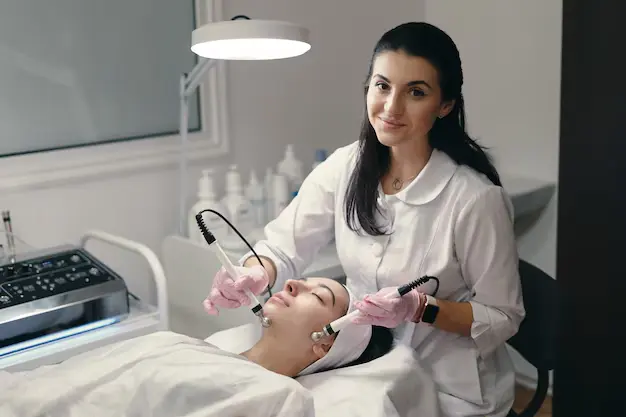Maintaining healthy skin requires consistent care and the right products. With expert guidance, you can establish a routine that caters to your skin’s specific needs. Leading dermatologists, including those based in the city of Chennai, have shared their top advice for the year 2024 to help you achieve glowing, healthy skin.
The Foundation of Every Routine
Cleansing your face is the first and most crucial step in any skincare routine. According to a dermatologist in Chennai, a gentle cleanser removes dirt, oil, and impurities without stripping the skin of its natural moisture. They recommend using a cleanser suited to your skin type—whether it’s oily, dry, or combination. A dermatologist in Chennai emphasizes that a good cleanser sets the stage for the rest of your skincare products to work effectively.
Choosing the right cleanser can prevent breakouts and irritation. It’s essential to avoid harsh soaps that can disrupt the skin’s natural barrier. Instead, opt for products with hydrating and soothing ingredients like glycerin and aloe vera. Cleansing should be done twice daily, once in the morning and once before bed, to keep your skin clean and refreshed.
Exfoliation: Removing Dead Skin Cells
Exfoliation helps to remove dead skin cells, revealing a brighter and smoother complexion. There are two main types of exfoliants: physical and chemical. Physical exfoliants use small particles to scrub away dead skin, while chemical exfoliants use acids or enzymes to dissolve them. Dermatologists recommend using chemical exfoliants as they are generally gentler and more effective.
Alpha-hydroxy acids (AHAs) and beta-hydroxy acids (BHAs) are popular chemical exfoliants. AHAs, such as glycolic and lactic acids, are water-soluble and work on the skin’s surface, making them ideal for dry or sensitive skin. BHAs, like salicylic acid, are oil-soluble and penetrate deeper into the pores, making them suitable for oily or acne-prone skin. Regular exfoliation, about two to three times a week, can prevent clogged pores and promote cell turnover.
Moisturising: Hydration is Key
Keeping your skin hydrated is vital for maintaining its health and appearance. A good moisturiser locks in hydration and provides a protective barrier against environmental stressors. It’s important to choose a moisturiser based on your skin type and concerns. For example, those with oily skin might prefer a lightweight, oil-free gel, while individuals with dry skin might benefit from a richer cream.
Moisturisers containing hyaluronic acid, glycerin, and ceramides are highly recommended by dermatologists. Hyaluronic acid is a powerful hydrator that can hold up to 1,000 times its weight in water, making it excellent for all skin types. Glycerin is another effective humectant that draws moisture into the skin. Ceramides help to restore the skin’s natural barrier, keeping it protected and healthy. For more detailed information on choosing the right moisturiser, check out this comprehensive guide to moisturisers.
Sun Protection: A Daily Essential
Sun protection is perhaps the most important step in any skincare routine. Exposure to ultraviolet (UV) rays can lead to premature ageing, hyperpigmentation, and even skin cancer. Dermatologists unanimously agree that using a broad-spectrum sunscreen with an SPF of at least 30 is non-negotiable.
Sunscreen should be applied every morning, regardless of the weather or your plans for the day. Reapplication is necessary every two hours if you’re spending extended periods outdoors or after swimming or sweating. For those concerned about the greasy feel of traditional sunscreens, there are now many lightweight, non-comedogenic options available that won’t clog pores or cause breakouts.
Aside from sunscreen, incorporating additional protective measures like wearing hats, sunglasses, and seeking shade can further safeguard your skin from harmful UV rays. These steps are especially crucial in areas with high sun exposure, such as Chennai.
Targeted Treatments: Addressing Specific Skin Concerns
Every individual has unique skin concerns that may require targeted treatments. Whether it’s acne, hyperpigmentation, or signs of ageing, there’s a treatment to address every issue. Retinoids, for example, are vitamin A derivatives that can help reduce fine lines, improve skin texture, and treat acne. However, they can be quite potent, so it’s best to start with a lower concentration and gradually increase it as your skin builds tolerance.
For pigmentation issues, ingredients like vitamin C, niacinamide, and licorice extract can help brighten the skin and even out tone. Vitamin C is a powerful antioxidant that protects against free radical damage and boosts collagen production. Niacinamide, also known as vitamin B3, is excellent for reducing inflammation and improving the skin barrier. Licorice extract can help fade dark spots and has anti-inflammatory properties.
When incorporating new treatments into your routine, it’s important to do so gradually to avoid overwhelming your skin. Patch testing new products and introducing them one at a time can help you monitor how your skin reacts. For a deeper dive into the benefits of these ingredients, explore this in-depth article on effective skincare ingredients.
Conclusion
Building an effective skincare routine requires understanding your skin’s needs and choosing products that address them. Cleansing, exfoliating, moisturising, and protecting your skin from the sun are the foundational steps recommended by dermatologists. Targeted treatments can further enhance your routine by addressing specific concerns. With expert advice and the right products, you can achieve and maintain healthy, radiant skin in 2024 and beyond. Remember, consistency is key, and it’s never too late to start caring for your skin. Follow these dermatologist-approved tips to create a routine that works for you.






